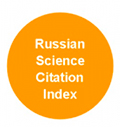How to overcome Russia’s lag in life expectancy?
Abstract
The article presents materials of the Round table organized by the editorial office of the "Demographic Review" together with the HSE Institute of Demography. Roundtable participants conclude that there is a significant gap between Russia and most developed countries in life expectancy, and discuss recent trends in mortality and life expectancy in Russia and the question of their regional differences. They consider that the current state of statistical information on mortality and morbidity of the population of Russia should be critically assessed. Sex-specific mortality and changes in the structure of causes of death in Russia since 1990 are discussed, and the link between mortality trends and alcohol consumption is examined. Roundtable participants pay attention to the low efficiency of the Russian health care system and reflect on ways of improving the system, without which it is impossible to overcome the current Russian backwardness.
The Round table, held on April 17, 2015, was attended by the leading experts in the field of demography and public health:
Evgeny Andreev, Senior Fellow at the Center of Demographic Research, New Economic School;
Anatoly Vishnevsky, Director of the Institute of Demography, National Research University Higher School of Economics;
Sergey Ermakov, Professor, Senior Researcher at the Institute of Social and Economic Studies of Population; Chief Researcher at the Research Institute of Health Organization and Informatics, Ministry of Health of Russia;
Alla Ivanov, Professor, Head of the Department of Population Health Statistics at the Research Institute of Health Organization and Informatics, Ministry of Health of Russia;
Ekaterina Kvasha, Senior Research Fellow, Institute of Demography, National Research University Higher School of Economics;
Yury Komarov, Professor, Member of the Committee of Civil Initiatives;
Tatiana Kharkova, Senior Research Fellow, Institute of Demography, National Research University Higher School of Economics;
Sergey Shishkin, Director of the Health Policy Centre, National Research University Higher School of Economics;
Vladimir Shkolnikov, Head of the Laboratory of Demographic Data at Max Planck Institute of Demographic Research (Germany).
Downloads
References
Federal'nyy zakon FZ-143 ot 15.11.1997 (red. ot 31.12.2014) “Ob aktakh grazhdanskogo sostoyaniya” [Federal Law FZ-143 from 11.15.1997 (ed. Of 31.12.2014) “On Acts of Civil Status”].
Federal'nyy zakon FZ-323 ot 21.11.2011 “Ob osnovakh okhrany zdorov'ya grazhdan v Rossiyskoy Federatsii” [Federal Law FZ-323 from 21.11.2011 “On the basis of public health protection in the Russian Federation.”].
Grigoriev P., F. Mesle, V.M. Shkolnikov, E.M. Andreev, A. Fihel, M. Pechholdova, J. Vallin (2014). The recent mortality decline in Russia: beginning of the cardiovascular revolution? // Population and Development Review. 40(1): 107-129.
Leon D.A., L. Chenet, V.M. Shkolnikov, S.Zakharov, J. Shapiro, G.Rakhmanova, S.Vassin, M. McKee (1997). Huge variations in Russian mortality rates 1984–1994; artefact, alcohol, or what? // The Lancet. 350–9075: 383-388.
McKee M., D.A. Leon (2013). Components and possible determinants of decrease in Russian mortality in 2004-2010 // Demographic Research. 28 (32): 917-950.
McKee M., V. Shkolnikov, D. Leon (2001). Alcohol is implicated in the fluctuations in cardiovascular diseases in Russia since the 1980s // Ann Epidemiol. 11: 1–6.
Naseleniye Rossii 2012: dvadtsatyy yezhegodnyy demograficheskiy doklad [Population of Russia 2012: Twentieth annual demographic report] (2014) / Otv. red. A.G. Vishnevskiy. M.: Izdatel'skiy dom NIU VSHE.
Onishchenko G. (2009). Vyyti iz alkogol'no-tabachnogo tumana [To come out of the alcohol-tobacco fog] // Rossiyskaya gazeta. 14 yanvarya 2009 g.
Osnovnyye polozheniya strategii okhrany zdorov'ya naseleniya RF na period 2013-2020gg. [The main issues of the health population strategy in the Russian Federation for the period 2013-2020] URL: https://komitetgi.ru/projects/1360
Postanovleniye Pravitel'stva RF №1049 ot 21 noyabrya 2013 g. “Ob utverzhdenii pravil predstavleniya organami zapisi aktov grazhdanskogo sostoyaniya svedeniy o gosudarstvennoy registratsii rozhdeniya, smerti, zaklyucheniya i rastorzheniya braka v Federal'nuyu sluzhbu gosudarstvennoy statistiki” [RF Government Resolution №1049 from November 21, 2013 "On approval of the rules of presenting the data on state registration of births, deaths, marriages and divorces to the Federal Service of State Statistics by the register offices."].
Preston S.H. (1975). The Changing Relation between Mortality and Level of Economic Development // Population Studies. 29 (2): 231–248.
Sobotka T., W. Lutz (2009). Misleading Policy Messages from the Period TFR: Should We Stop Using It? // European Demographic Research Papers 4. Vienna: Vienna Institute of Demography of the Austrian Academy of Sciences.
Stalin I.V. (1952). Politicheskiy otchet Tsentral'nogo Komiteta na XIV s"yezde VKP(b) 18 dekabrya 1925 goda [The political report of the Central Committee at the XIV Congress of the CPSU (b) December 18, 1925] // I.V. Stalin. Sochineniya. T. 7. M.: 340.
Terris M. (1976). The Epidemiologic Revolution, National Health Insurance and the Role of Health Departments //American Journal of Public Health. 66 (12): 1156.
Vishnevsky A. (1986). Chelovecheskiy faktor v demograficheskom izmerenii [The human factor in the demographic dimension] // Kommunist. №17: 71-72.
























